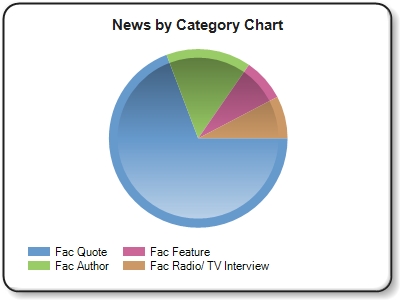Top Stories
| The Undark Interview: A Conversation with Alan Kraut |
| Distinguished Professor of History Alan Kraut spoke to Undark Magazine about the interplay of immigration issues and public health. Kraut said, “Throughout American history, right up to the present stigmitzation of the Chinese for the coronavirus, you have this underlying theme. I've often referred to it as the ‘other pandemic' – a pandemic of hate, a pandemic of prejudice.” (4/24) |
| 2020 Could Reimagine Conventions, but Democratic Chairs See Value in Tradition |
| Amy Dacey, executive director of the Sine Institute of Policy & Politics, spoke to the Morning Consult about how coronavirus could change the national convention system. Dacey said, “I still think the party can capitalize on a huge national event that brings people together from different parts of the party.” Dacey also spoke to KERA-FM about Joe Biden's presidential campaign. Allan Lichtman, distringuished professor of history, spoke to the National Interest. Capri Cafaro, executive-in-residence in the School of Public Affairs, spoke to Cronkite News about fundraising. (4/24, 4/27) |
Faculty Authors
| Making It Easier to Declare Bankruptcy Could Avert Economic Catastrophe |
| Economics Professor Mary Eschelbach Hansen co-wrote an article for The Washington Post about how allowing businesses to declare bankruptcy could prevent a long-lasting depression. Hansen and her co-author wrote, “Congress can prevent a long-lasting depression by making it simpler for businesses, large and small, incorporated and unincorporated, to petition to reorganize their debts in bankruptcy – which automatically stops debt collection.” The piece won an award from the Stanton Foundation for best new applied history article presenting a policy prescription to address COVID-19. (4/24) |
| Mobile Phone Data Is Useful in Coronavirus Battle. But Are People Protected Enough? |
| Andrew Rens, postdoctoral fellow in the Internet Governance Lab, co-wrote an article for The Conversation about ensuring privacy protections for individuals during the coronavirus pandemic. Rens and his co-authors wrote, “These are exceptional times calling for extraordinary measures. But do they justify the wholesale sacrifice of our rights?” Jennifer Daskal, professor in the Washington College of Law, spoke to Politico about rising medical privacy concerns.(4/27, 4/28) |
Expertise
| Uncertain Job Market Awaits Soon-to-Be Graduates |
| Gihan Fernando, executive director of American University's Career Center, spoke to Inside Higher Ed about preparing students and graduates for the job market during the coronavirus pandemic. Fernando said, “On one hand, we make students available for real opportunities. Then for students having trouble, helping them productively spend that time so they have the opportunity to build skills. The story you tell about how you spent your time while you're looking is just as important as anything.” (4/28) |
| Michelle Obama Will Be the Focus of the Upcoming Netflix Documentary 'Becoming' |
| Anita McBride, executive-in-residence in the School of Public Affairs, spoke to The Washington Post about Michelle Obama's post-White House legacy. McBride told the Post that while Obama was initially a reluctant first lady, she has gone “on to form lasting connections with the public through her ‘extraordinary use of media and pop culture and television.'” (4/27) |
| Health Officials Ready New Guidelines As Restrictions Ease |
| Washington College of Law Professor Lindsay Wiley spoke to the Associated Press about new health recommendations as states begin to gradually lift restrictions. Wiley told AP that the new guidance could provide state officials cover if businesses challenge the new requirements in court. The article appeared in 818 outlets, including The New York Times. (4/27) |
| Women Leaders Are Flattening the Curve |
| Betsy Fischer Martin, executive director of the Women & Politics Institute, appeared on the Foreign Policy Magazine podcast, “Don't Touch Your Face,” to discuss how women-led countries have handled the pandemic. Fischer Martin said, “What we're seeing now are some of these female leaders that are exhibiting these qualities that are more typically associated with female leadership, and we're seeing that really pays dividends.” (4/27) |
| D.C. Town Hall on Business Recovery Focuses on Equity |
| Andre Perry, scholar-in-residence in the School of Education, participated in a telephone town hall on providing equitable recovery for D.C. businesses impacted by the coronavirus pandemic. Perry said, “If there is to be any truth to the idea that we are all in this together, cities must step up now.” The townhall was covered by WTOP-FM. (4/28) |
| The Debate About Whether Expanded Unemployment Insurance Is Too Generous |
| Associate Professor of Public Administration Bradley Hardy spoke to Vox about claims that unemployment insurance is too generous. Hardy said, “The first part of the problem is providing liquidity to individuals and families so they can pay for their lives, maintain their wellbeing, economically and otherwise.” (4/28) |
| Day of Reckoning Dawns for Industrial Livestock Farms |
| Garrett Graddy-Lovelace, associate professor in the School of International Service, spoke to E&E News about supply chain challenges for the meat industry caused by the coronavirus pandemic. Graddy-Lovelace told E&E News that she wouldn't be surprised to see pork shortages in the next couple of weeks. (4/28) |
|


